goldenpixelcoop-en
92 posts
Don't wanna be here? Send us removal request.
Text



You'll never watch alone: The Screen as a Place of Work
Edited by The Golden Pixel Cooperative: Enar de Dios Rodríguez, Nathalie Koger, Olena Newkryta
Texts by Anna Caterina Dalmasso, Lého Galibert-Laîné, Elisa Giardina Papa, Steven Gonzalez Monserrate, Annemarie Hahn & Konstanze Schütze, Axel Stockburger, Ellen Wagner Graphic design: Susanne Keuschnig, Mathias Windelberg Cover design: Simona Obholzer
English, 96 pages, 16,5 x 22 cm, illustrations in color and b/w, softcover June 2025 ISBN 978-3-903447-22-6
“You’ll Never Watch Alone. The Screen as a Place of Work” deals with one pressing issue within the hypercapitalist system that prevails globally: the screen as a workspace, an infrastructure, and a veil that renders workers largely invisible. Coming from a wide range of fields of knowledge production, the contributions gathered in this publication present critical perspectives on contemporary forms of screen-based work.These texts not only examine extractivist practices related to digital technologies and their relationship to labour, but also situate the origins and power dynamics of these infrastructures within historical, material, and sociopolitical networks. Rather than presenting a homogeneous perspective, the book weaves together scientific, artistic, and theoretical approaches into a multifaceted discourse that is both theoretically grounded and playfully experimental.
You can order your copy here: https://www.schlebruegge.com/en/content/youll-never-watch-alone
0 notes
Text



Unha Imaxe, unha Foresta (An Image, a Forest)
Lecture and film screening 29.05.2025, 18:00 Uhr Normal - Espacio de Intervención Cultural Paseo Rda., 47 15011 A Coruña, Spain Curated by Enar de Dios Rodríguez With films by Pille-Riin Jaik, Simona Obholzer, Christiana Perschon, Lisa Truttmann
“Unha Imaxe, unha Foresta” ('An Image, a Forest') is a film program showcasing works by the Golden Pixel Cooperative at the art space Normal in A Coruña, Spain. Normal is an active cultural institution that provides a platform for the presentation, production, and co-production of a wide range of contemporary cultural initiatives and projects—from cinema and visual arts to multimedia and experimental music. Dedicated to connecting culture with public life in the broadest sense, Normal emphasizes gender policy, collaboration, and critical reflection, offering an interdisciplinary film program.
The film program showcases a diverse range of works by cooperative members, encompassing abstract pieces, experimental film, and video art. Together, these works reflect the variety of artistic positions, aesthetic approaches, and narrative strategies within the organization. Much like words that, when combined, form a sentence, the combination of these audiovisual pieces can be read as a commentary on landscapes from cinematic, ecological, and social perspectives.
Before the screening, a public presentation will introduce The Golden Pixel Cooperative’s activities, interests, and goals to a Spanish audience.
Program:
“das bin nicht ich, das ist ein bild von mir”, Christiana Perschon, 2018, 9 min. “DIN 18035”, Simona Obholzer, 2024, 13 min. “all i had was weed (but what they wanted was flowers)”, Pille-Riin Jaik, 2023, 14 min. “Critters Chorus, Cycle 1”, Lisa Truttmann, 2022, 13 min.
Image credits
Lisa Truttmann, “Critters Chorus, Cycle 1” (film still), 2022 Simona Obholzer, “DIN 18035” (film still), 2024. © Bildrecht Vienna, 2025 Pille-Riin Jaik, “all i had was weed (but what they wanted was flowers)” (film still), 2023
0 notes
Text

Framing Collective Action (House, Street Land)
Series of film programs
30/04, 14/05 and 04/06/2025, 7 pm mumok cinema Museumsplatz 1 1070 Wien
A series of screenings conceived by Enar de Dios Rodríguez and Olena Newkryta
With works by Center for Spatial Technologies in collaboration with Forensis & Forensic Architecture, cinéma copains in collaboration with pátio vazio, Colectivo Los Ingrávidos, Collectif Faire-Part, Eulàlia Rovira and Adrian Schindler, Forensic Architecture, Künstler*innen Gruppe Schandwache, Sistren Theatre Collective, The Victor Jara Collective, Yugantar Film Collective
The screening series "Framing Collective Action" presents artistic and documentary films created within collective structures. By linking historical and contemporary examples, the series explores the potentials of collective filmmaking through diverse aesthetic approaches. Each film program focuses on a specific spatial context ("House", "Street", "Land") and examines the political and social impact of collective filmmaking both in front of and behind the camera, within and beyond the frame.

Framing Collective Action: House
WE, 30/04/2025, 7 pm mumok cinema Museumsplatz 1 1070 Wien
Program
Yugantar Film Collective "Molkarin (Maid Servant)", 1981, 26 min.
Center for Spatial Technologies in collaboration with Forensis & Forensic Architecture "A City Within A Building," 2023, 21 min.
cinéma copains in collaboration with pátio vazio "Urban Solutions", 2022, 30 min.
"House", the first iteration of this series, brings together three short films which frame collaboration and action within a domestic building—simultaneously opening up and critically interrogating the notion of home. Through this selection of audiovisual works, the house reveals itself as an impermanent shelter, a site with questionable borders, and a space that invisibilizes the working conditions of those that must maintain it. Yet, as these films from India, Ukraine, and Brazil demonstrate, this very same house can serve as a place from which collective action might emerge.

Framing Collective Action: Street
WE, 14/05/2025, 7 pm mumok cinema Museumsplatz 1 1070 Wien
Followed by a Q&A with the collective Schandwache
Program
The Victor Jara Collective "In the Sky's Wild Noise", 1983, 28 min.
Collectif Faire-Part "Faire-Part", 2019, 60 min.
Künstler*innen Gruppe Schandwache "Schandwache", 2021, 13 min.
Time and again, the street serves as a stage for social struggle. While it is used everyday as an infrastructural space, it is only through collective and physical occupation that it becomes a public arena where socio-political demands can be voiced. This is shown in the three selected short films of this program, "Street", which span different times and places—from 1983 to 2021, and from Georgetown to Kinshasa and Vienna. The films take varied approaches to dealing with the street, at times performative, documentary, theatrical, or activist. In doing so, they document actions that expose the lasting legacies of colonialism and anti-Semitism while also opening up possibilities for change.

Framing Collective Action: Land
04/06/2025, 7 pm mumok cinema Museumsplatz 1 1070 Wien
Program
Forensic Architecture "If toxic air is a monument to slavery, how do we take it down?", 2021, 35 min.
Eulàlia Rovira and Adrian Schindler "La plaga, el provecho", 2022, 5 min.
Sistren Theatre Collective "Sweet Sugar Rage", 1985, 42 min.
Colectivo Los Ingrávidos "Chinampas (The Floating Gardens)", 2023, 5 min.
Human-shaped landscapes are often reflections of social desires—for solitude and quietness, but also for resources and control. The four films composing this program explore different forms of landscape exploitation while revealing how anthropocentric environmental transformations are intrinsically entangled with social, political, and historical issues. In the last program of this series, "Land", the collectively produced films develop different cinematic strategies to deal with the continuity of environmental racism, feminist labour struggles, colonial traces and indigenous knowledges. The journey proposed through this selection of films takes us from the sugar cane fields of Jamaica to burial grounds in the USA used as petrochemical plantations, from stolen flora and fauna seeded in Spain to the surviving ancestral Nahuatl floating gardens in Mexico.
1 note
·
View note
Text

Golden Pixel Talks: Can Images Grieve? Sharing a Philosophy of Praxis
The Role of Language, Oral History, Time, Erasure, Tracing Absences, Fact versus Fiction, Secrets, and Museums
With Noor Abuarafeh, Huda Takriti, and Lina Ramadan
Language: English
Duration: 59 minutes
Host and editor for this edition: Nathalie Koger Sound design: Vinzenz Schwab Concept: Mona SchwitzerPodcast available from February 28, 2025 on https://soundcloud.com/golden-pixel-cooperative
How can artists engage with gaps in historiography and archives? What methods and media form the foundation for an active practice of remembering and bearing witness? And how can the process of “re-remembering” be shaped by cultural practitioners?
Taking their joint exhibition project as a starting point, artists Noor Abuarafeh and Huda Takriti, along with curator Lina Ramadan, reflect on their practices in the fourth edition of the Golden Pixel Talks. They approach their work as a form of anti-colonial dialogue with existing—or absent—historical images, objects, and narratives. By interweaving key concepts, they develop a philosophy of their own practice.
Golden Pixel Talks invite artistic and academic researchers whose fields intersect to engage in dialogue, enriching the film-focused perspectives of the Golden Pixel Cooperative with socio-political and artistic viewpoints. The podcast format creates discursive spaces for explorations at the boundary between the known and the unknown in science and art.
Noor Abuarafeh (b. 1986, based between Jerusalem and Rotterdam) Her practice spans video, performance, publications, and video installations, with a focus on the themes of memory, history, archives, and the complexities of tracing absence. Through her text-based videos and performances, Abuarafeh’s works questions how history is shaped, constructed, perceived, visualized, and understood—and examines the intersections between fact and fiction as well as imagination in the construction of historical narratives. In The past Abuarafeh has shown in solo and group exhibitions at De Appel (2024), Art Jameel (2024), Jakarta Biennale (2024), Frieze Museum (2023), Venice Biennale (2022), Berlin Biennale (2020), and Sharjah Biennale 13 (2017). She also participated in the Off-Biennale Gaudipolis in Budapest (2017) and the Qalandia International in Jerusalem (2018), among others. In 2019, she held her first solo exhibition, The Moon is a Sun Returning as a Ghost, curated by Lara Khaldi in Jerusalem.
Huda Takriti (b. 1990 in Syria, lives in Vienna) superimposes personal and national narratives in her video works and her image-text or text-text collages, aiming to spotlight gaps in historical and national memory. She is currently pursuing a PhD-in-Practice at the Academy of Fine Arts in Vienna, where she is examining the notion of archival erasure relating to the (hi)stories of female freedom fighters from the Middle East in times of armed anti-colonial struggle. She questions the construction and production of historical narratives, and explores the potential of “contamination” as a way for bridging archival gaps. She completed her master's studies at the TransArts department at the University of Applied Arts Vienna in 2020. She also completed her bachelor's degree at the Faculty of Fine Arts in Damascus, Syria, in 2012. Her work has been awarded several scholarships and prizes, including the Vordemberge-Gildewart Award (2022), the Kunsthalle Wien Prize (2020), and the Camargo Foundation Fellowship (2023), among others.
Lina Ramadan is a curator and writer specializing in contemporary and modern art, currently based in Vienna. Her research focuses on post-colonial perspectives on the MENA region, female artists, and solidarities. From 2016 to 2022, she served as curator at Mathaf: Arab Museum of Modern Art, Doha. Lina Ramadan is the editor of the coming book Madness of the Anthropocene: Thinking with an Image (Kaph & 421, 2024). Recent curatorial projects include Several Attempts for not Forgetting: Noor Abuarafeh & Huda Takriti, Philomena+, Vienna (2025) Ibi Ibrahim: Like Every Leaving Wasn't a Country (2024), Entre, Vienna; Taysir Batniji: No Condition is Permanent (2022-23); Kader Attia: On Silence, (2021); Raqs Media Collective: Still More World (2019); and Mohamed Melehi: 1959-1971 (2017-2018). Her recent published work include "Moments of Return in the work of Mohamed Bourouissa, Yto Barrada and Iman Issa" in Avant-garde & Liberation. Contemporary Art and Decolonial Modernism 2024, Ed. Kravagna, C. (Mumok, 2024); "Foreword" in Photography from Yemen. Ed. Vartanian Collier, L & Ibrahim, I. (Makan Press, 2024); and "The Palaver Tree'' in Farid Belkahia: For A New Modernity. Ed. Gauthier, M. (Centre Pompidou & Mathaf, 2021). Ramadan is the recipient of the 2024-25 Darat al Funun Fellowship and is currently pursuing a PhD at the Academy of Fine Arts, Vienna.
Image credits: Documentation of the recording setup © Huda Takriti, 2025
1 note
·
View note
Text

Golden Pixel Talks: How to Develop a Filmic Practice of Care?
With Marlies Pöschl and Petra Bauer, conceived by Mona Schwitzer. Sound design by Vinzenz Schwab. Host, curator and editor for this edition: Nathalie Koger. Podcast available from 17th January 2025 on www.soundcloud.com/golden-pixel-cooperative
With Marlies Pöschl and Petra Bauer, conceived by Mona Schwitzer. Sound design by Vinzenz Schwab. Host, curator and editor for this edition: Nathalie Koger.Podcast available from 17th January 2025 on www.soundcloud.com/golden-pixel-cooperative
What possibilities do filmic practices open up for communities? Can new social configurations emerge through filmmaking projects? What roles do we, as filmmakers, assume in our collaborations with communities in the process of forming? Does camera work play a role in this? And what ethics of the visual become tangible within the relational networks that arise?
Drawing on their own projects and experiences as artists and practitioners, Marlies Pöschl and Petra Bauer explore their filmic practice as a form of care work in the third edition of the Golden Pixel Talks.
Petra Bauer is an artist, filmmaker, and professor of film & media with a responsibility for the research area Art Technology and Materiality at the Stockholm University of the Arts. In her artistic practice and research, she is interested in how we can approach film as a space for social and political explorations. Her work addresses how women organize, resist and refuse using both aesthetics and politics. She has formed long-term collaborations with several different feminist organisations including Southall Black Sisters in London, the sex-worker led organisation SCOT-PEP, Edinburgh and The Women's Centre in Tensta-Hjulsta, Stockholm. She is one of the initiators of the feminist platform k.ö.k (Women Desire Collectivity). https://f-a-m.group/ https://www.mdemc.se/#/fifteen-zero-three-nineteenth-of-january-two-thousand-sixteen/
Marlies Pöschl is an artist, filmmaker, curator and educator. She currently teaches at the Academy of Fine Arts Vienna. Shifting between artistic, curatorial and educational approaches, Pöschl is interested in art as a form of knowledge production. She understands filmmaking as social practice and often collaborates with actors from outside the art world in search for polyphonic narrations and open-ended dramaturgies. As co-founder and former chairperson of The Golden Pixel Cooperative, an association for moving images, she has developed artistic-curatorial strategies for exhibitions, screenings and projects in public space with a focus on feminism and ecology.
Image credits: Documentation of the recording setup © Marlies Pöschl, Bildrecht, 2024
0 notes
Text

GPC STREAMS (#5) Next Stop
Online Screening
20.11.2024–26.11.2024, 21:00 until 22:51 (in your timezone)
Each evening at the GPC Online Screen http://streaming.goldenpixelcoop.com
With works by Greta Alfaro, Tekla Aslanishvili, Lisa Truttmann Curated by Enar de Dios Rodríguez
When James Watt improved the steam engine in 1776, he likely did not anticipate that it would become an emblem of a future geological era now referred to as the Anthropocene. Adapted for movement on steel rails that spanned vast distances, the steam engine initiated a radical transformation of space and time, significantly influencing life, production, and the very soil beneath it. Once essential for the circulation of people and goods, large portions of the railway system eventually became obsolete, outpaced by more profitable modes of transportation and the shifting locations of extractive sites (maps of abandoned railways are a telling reminder of these ruins). And yet, even today, the railway still holds the promise of “prosperity,” exemplified by the New Silk Road initiative: an ambitious infrastructure project set to establish the fastest rail link across Eurasia, representing a massive effort to further optimize globalization and boost economic profit
The temporal paradox between obsolescence and promise, ruin and construction, as well as the maintenance of a system and its sabotage, becomes evident through the three films that compose “Next Stop,” whose protagonists are railways systems in Austria, Spain, South Caucasus, and Caspian regions. From fragmented screen tales to experimental documentaries and meditative explorations, each work follows steel lines that demonstrate their embeddedness in the landscape, the political context, the economic influxes, and the labor around them. Through three distinct aesthetic and narrative approaches, “Next Stop” aims to attend to that which the train implies, not only in material, historical, or sociopolitical terms but also in its specific form of motion and vision.
PROGRAM (112 min.)
21:00 - 21:20
“Tracks I-III” by Lisa Truttmann
21:21 - 22:07
"A State in a State" by Tekla Aslanishvili
22:08 - 22:52
"Decimocuarta estación (Fourteenth Station)" by Greta Alfaro
“GPC STREAMS” is a series of online screenings that take as a starting point one artwork by a member of The Golden Pixel Cooperative, which is combined with artworks by international artists. The aim of these programs is to give visibility to current thematic interests of the cooperative through wider angles and artistic approaches.

Lisa Truttmann
Tracks I-III / AT / 2021 / 20:00 min.
Inspired by phantom rides—films from the late 19th century shot from the front of moving trains—“Tracks I-III” follows old and new technological traces that have shaped movement and representation. Historical landscapes once captured along railway lines are now reimagined through a carefully fragmented scenery, where motion splits, diverges, and advances in all possible directions. Truttmann’s playful exploration of spatial and temporal dislocations is grounded in a specific location and its history: a section of the “Ischlerbahn,” one of Austria's first major long-distance rail lines, which was closed in 1957 despite strong protests from all segments of the population.

Tekla Aslanishvili
A State in a State / GE, DE, ES / 2022 / 47:00 min.
Peeking out from a bedroom window, “A State in a State” opens with a personal presence and its coexistence with the nearby railway line. From this intimate perspective, the film broadens its focus to explore the historical, geopolitical, and economic dimensions related to the construction and fragmentation of railroads in the South Caucasus and Caspian regions. This expanded view attentively observes the complex entanglements between transport networks and political borders, revealing how railway networks can serve as potential instruments for political and social acts of sabotage.

Greta Alfaro
Decimocuarta estación (Fourteenth Station) / ES / 2019 / 41:05 min.
Decimocuarta estación (Fourteenth Station) is a unique portrait on the rails of the so-called “emptied Spain”, rural areas of interior Spain that have experienced immense depopulation since the 60s. Through this moving portraiture, Alfaro invites us on a meditative journey where travel becomes an act of observation and vice versa. Typically presented in an installation that creates a seamless loop, where the motion becomes infinite, Alfaro’s work proposes a technically sophisticated and poetically infused contemplation that not only brings us to a wide range of spaces but also encompasses simultaneous temporalities.
0 notes
Text




Elastic Chronologies
With: Olena Newkryta, Simona Obholzer, Marlies Pöschl and a collaboration between Daniel Hüttler, Pille-Riin Jaik, Klaus Rabeder and Janina Weißengruber
Curated by: Katharina Swoboda Exhibition design by: Pernille Christensen
Opening: Friday 08.11 at 7 pm 08.11-22.11.2024 Tuesday-Friday 17:00-20:00 Medienwerkstatt Wien Neubaugasse 40A, 1070 Vienna
Film images exist in corset of time. They are delivered to viewers in a strictly fixed sequence, so as to create the impression of movement and narrative. Certain television films even insist on repeatedly delivering key information and details, as if they couldn't quite trust their audience's ability to concentrate. By contrast, photographs or paintings allow us to create our own timeline. Our eye is free to jump back and forth between points and areas of interest and trace its own paths, often below the radar of conscious awareness.
Inside a cinema auditorium, the audience is also exposed to time in a physical way. The space is darkened, the body pressed inside an armchair. Our radius of movement is restricted, the mind softened. Digital media changes all this: video recorders and online platforms allow us to control the timeline. We can skip forwards and backwards by 10 seconds, repeat a clip, or play it at double speed. The chronology of a film is in the hands of the audience.
Likewise, visitors at an exhibition can also take time into their own hands - not by scrolling through a video-timeline, but by strolling freely through the exhibition space. Our physical presence and movement allows an individual chronology of the works to emerge. Everyone decides on their subjective "entry and exit points" and sets their own viewing times.
The films shown in the present exhibition focus on precisely this complex relationship between camera work, physical movement, and editing. In individual and collaborative works by Simona Obholzer, Marlies Pöschl, Olena Newkryta, Pille-Riin Jaik, Daniel Hüttler, Klaus Rabeder and Janina Weißengruber, there is a shared affinity for conceptual visual techniques, poetic imagery, and strategic camera work.
The members of the Golden Pixel Cooperative have a long history of exploring the moving image. Their work is always also a reflection of film as a technical and cultural medium. Likewise, since its founding in the early 1980s, the Medienwerkstatt has focussed on critically investigating video and technical developments[1] . Their[2] space therefore offers an ideal terrain for this exhibition project.
“1989-1997” is an artistic short film by Simona Obholzer documenting a vacant school building in the artist's town of origin. The building was vacated after a new school campus opened in 2020. Obholzer, who attended the school for eight years as a child, returns to the building and its rooms, now devoid of pupils, teachers and conflicts. She registers the institutional school architecture and its authoritarian codes. The film accounts for both the experiences and memories of the artist as a former pupil, and her self-reflecting perspective as an adult artist. Two time periods are thus interwoven into a single film.
In ”Der weiße Bereich” (2022), Marlies Pöschl takes the viewer on a journey to 76-year-old Jill Denton, who lives in the Vercors mountains in France. Jill experiences herself as electrosensitive and avoids modern technologies, as they make her ill. To ensure her wellbeing, she establishes a new "zone blanche" (white area) in and around her home every day. In French, "zone blanche" refers to a dead zone - areas without wireless reception or electromagnetic radiation. Jill does her errands and visits friends in a village 40 minutes away. Sometimes, she spends hours looking for places where she doesn't feel any electromagnetic radiation. Respecting the sensitivity of her protagonist, the filmmaker works with a wind-up 16 mm Beaulieu camera. The hyper-realistic soundtrack is entirely studio-created. In this way, the film registers the force fields in Jill's biography through aesthetic means. An anachronistic way of life is brought into a present permeated by the internet, smartphones and GPS.
The experimental film “Freedom in the Present Past” (2024) is a collective film by Daniel Hüttler, Pille-Riin Jaik, Klaus Rabeder and Janina Weißengruber. Filmed in Székesfehérvár (HU), Lümandu (EE, Estonia), Waizenkirchen (AT) and Gresten (AT), it portrays four old buildings in rural areas, as well as their current inhabitants. We visit a farm where the farmland has been toxically contaminated. We witness a forest barn with a collapsed roof evolve into a new habitat, and a family home full of Soviet history and socialist dreams. In a former family business in Waizenkirchen, we discover a slogan written with a white pen: "Times are changing. The times are changing you." The residents' stories and memories, as well as the associative links between buildings in "post-socialist" countries[3] and the "former West", open up a shared space that reveals what "rural Europe" could look like today.
In “Ruins in Reverse” (2020), Olena Newkryta documents the decay of a Soviet apartment block in southern Ukraine. Since several years, bricks and other building materials are being removed from the empty building and used for personal construction projects. This mirrors the larger relationship between the Soviet infrastructure on which everyday life still depends, and the massive political and social upheavals since the 1990s. Newkryta's essay film traces the private biographies and past ideologies inscribed in the building's ruins. The transfer of Soviet building materials into novel architectures shows processes of material appropriation and reuse, set between a crumbling past and a future in the making.
Works on display
Daniel Hüttler, Pille-Riin Jaik, Klaus Rabeder and Janina Weißengruber Freedom in the Present Past 2K, AT/EE/HU 2024, 24 min. German, Estonian, Hungarian with English subtitles
Marlies Pöschl Der weiße Bereich (The White Field) 16 mm transferred to 2K, colour, FR/AT 2022, 13 min. German with English subtitles
Simona Obholzer 1989-1997 2K, colour, sound, AT 2024, 7 min.
Olena Newkryta Ruins in Reverse Full HD, colour, UA/AT 2020, 25 min. Ukrainian with English/German subtitles
0 notes
Text

Acting/Reacting.
Workshop on collaborations between actors and artists With Nina Fog
Thursday, 31.10.2024, 2-6 pm Medienwerkstatt Vienna Neubaugasse 40A, 1070 Vienna
With a focus on artistic film, Nina Fog gives insights into her practice as an actress and performer. She draws on a rich palette of experiences in a wide range of contexts – cinema, TV, video, performance, theater and dance – and works with a comprehensive understanding of the conditions, differences and similarities of collaborations in different settings.
The workshop participants will experiment with relationships between people in front of and behind the camera. Techniques and methods of communication and collaboration can be tried out and developed. We will use our smartphone cameras to transform scenic ideas into moving material. Afterwards we will analyze the results and experiences in a safe environment.
The workshop is aimed at moving image artists and filmmakers, as well as actors and performers, and can also be used as a forum for possible further collaborations.
Please bring your smartphone to record short videos! More information about the preparation will be sent to you before the workshop.
We kindly ask you to register by 24.10.2024 to [email protected]
Participation is free of charge, but the number of available places is limited, so we will consider registrations in the order they are received. The workshop takes place in English.
The event is part of the workshop series "Sharing Skills" by The Golden Pixel Cooperative.
Nina Fog is a Japanese-Danish actress from Vienna trained at The Royal Central School of Speech and Drama in London. She specialises in a movement based approach to acting. She uses the physicality of the living body as an instrument to unearth the subconscious and speak the unspoken. Her background includes techniques such as Laban, Animal Studies, Lecoq.
Collaborations with Daria Martin, Annja Krautgasser, Antoinette Zwirchmayr, Toxic Dreams, Roman Scheidl, SDNA, Vanessa Ewan, Michael Winterbottom, Samuel Schwarz & Julian Grünthal, Lior Shamriz, James Price and others. http://www.ninafog.de
Image credit: Jack Goffe
0 notes
Text

GPC Lab 2024-2025
Timecodes. Temporality and Consequences Dramaturgical support for innovative/experimental film, video and moving image work
We are very pleased to present the participants of this year's GPC Lab and their projects. Anna Barbieri, Malena Martínez Cabrera and Kristina Leidenfrostova each explore, reflect on and construct the representation of time in unique ways in their respective projects. They will be mentored while developing their projects through individual meetings with dramaturges, workshops, and group feedback sessions. We would like to thank our jury, consisting of Anne Faucheret (Vienna) and Pınar Öğrenci (Berlin).
Anna Barbieri, Ebene 12 Position 4 (Level 12, Position 4) , essay film, approximately 20 min Mentor: Christine Moderbacher
In sterile corridors, a camera pans steadily, meditatively, punctuated by snapshots. Still images and a narrative voice contrast a neonatologist's explanations about complications related to premature birth. Somewhere amidst breast pumps, incubators, ventilators and feeding tubes, I found time to write.
Malena Martínez Cabrera: The Windows. A Virtual Encounter with the Beyond, approximately 77 min Mentor: Chloé Galibert-Laîné
In an altered state of consciousness, Aura finally understands the last letter her best friend Stella left ten years ago. Stranded in a virtual exile called Malhdad, Aura does everything within her mind's reach to reconnect with Stella, who is also searching for her.
Kristina Leidenfrostova: Our Last Hot Summer, short film, approximately 16 min Mentor: Angela Anderson
A fluid is found in the pericardium as a result of a viral infection. A lake dries up due to persistent drought. The film builds an interplay around the “disease of time”, where the hope for the healing of the body poetically contrasts with the incurable effects of climate change.
Image credits:
Kristina Leidenfrostova: Our Last Hot Summer, video stills from work in progress
0 notes
Text



Of Feathers, Whales and Dust
Presentation of the GPC Lab projects 2023-24 WE, 30/10/2024, 7:00-10:00 pm Medienwerkstatt 40a, Neubaugasse 40A, 1070 Vienna
Artists: Veronika Hösch, Kristina Cyan, Katja Verheul Moderator: Klaus Speidel
We are pleased to publicly present the projects that have been created during the GPC Lab 2023-24. The Lab offers a mentorship for the production of film, video and moving image works in different project phases. The projects receive individual dramaturgical support based on the needs of the project. The participating artists have developed specific performative formats in which they will present their moving image works. After this they will contextualise the dramaturgical angles they have developed, in a discussion with theorist Klaus Speidel.
Project presentations, 7:00-8:30 pm
Veronika Hösch: NiNi! Crossing feathersPerformative lecture and artist talk, 20 min
How does it feel when your feelings grow feathers? Are you connected with the sensuality of your ‘no’? In a performative reading, Veronika Hösch will give an insight into the exposé for her short film “NiNi! Crossing feathers”, focussing on the creation of her “filmic feather language”. Queer love is not learnt in isolation in “NiNi! Crossing feathers”, but collectively in a magical parallel world in the Lobau, a nature reserve and cruising area in Vienna. It is a place of productive chaos and care, where people and objects grow feathers that set boundaries, give and receive consent and validate feelings.
Mentor: Christine Lang and Caroline Bobek
Veronika Hösch is an artist living in queer-feminist friendships in Vienna (AT). Hösch's works have been shown internationally, at the Nakanojō Biennale, Nhà San Collective, Jakarta International Documentary and Experimental Film Festival and FrauenFilmTage Wien.
Kristina Cyan: When I Become a Whale (Wenn ich ein Wal werde) Artist talk and research presentation, 20 min The sci-fi film “When I Become a Whale” critically explores humanity's evolving relationship with the environment amidst capitalist exploitation and technological advancements. It questions how land, identity, and belonging are destabilised by environmental crises and offers a speculative future where nomadic life becomes the norm. Central to the narrative is the role of AI in decision-making, transitioning from terrestrial to underwater life, advocating for a paradigm shift toward sustainable coexistence.
Mentor: Christine Lang Kristina Cyan is a media artist based in Vienna (AT). Her works explore the intersection of media and bio-technology, feminism, and environmental studies. They have been shown at B3 Biennial Moving Images, European Media Art Festival, Rec.Forward Festival and the Austrian Film Museum.
Katja Verheul: Red Dust Research presentation and artist talk, 20 min Katja Verheul will give an introduction into the research she has been conducting for her film “Red Dust”. She will also place this work in the context of her other projects that relate to nuclear warfare, energy and waste.
A couple of times a year, the sky turns red in France. Sand dust from the Sahara passes through a difference in air pressure from North Africa to Southern Europe. This dust, a time capsule containing cesium-137 from the French nuclear tests in Algeria, covers everything. The film exposes the impact of a war that was never fought. A French veteran and archeology students share and speculate on what will be remembered and what will be hidden under the sand forever.
Supported by CBK Rotterdam, Gemeente Rotterdam, Mondriaan Fund, Cultuurfonds, Dos Mares residency program.
Mentor: Helin Celik Katja Verheul is a filmmaker based in Rotterdam (NL). She has shown her films, among others, at IFFR, Visions du Réel, Kasseler Dokfest, Dokufest, Sharjah Art Foundation, Art Rotterdam, MAXXI Museum and on Dutch television.
Framing feathers, whales and dust, 8:45-9:45 pmRoundtable discussion moderated by Klaus SpeidelTouching on theoretical, aesthetic as well as practical and process-oriented questions, the three artists will bring to light the specific dramaturgical frameworks they have developed in relation to their subject matters and give insights into the collaboration with their dramaturgy advisors.
Klaus Speidel is an art theorist, critic and curator. He holds a PhD in philosophy (Sorbonne). His writing has been published in numerous scientific journals, art magazines and catalogues. He teaches at the University for Applied Arts, Vienna, and other universities.
Images credits:
Kristina Cyan: When I become a Whale, 2024, video still Katja Verheul: Red Dust, 2024, video still Veronika Hösch: NiNi! Crossing feathers, 2024, Making of, film prop for Mz*Awareness, CCCQL
0 notes
Text
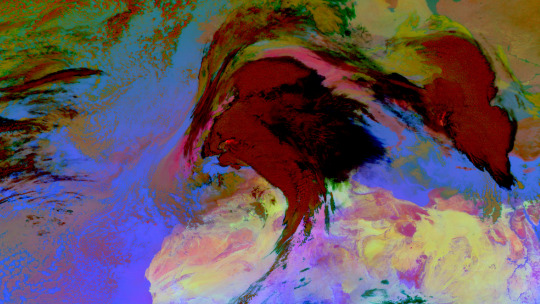
Open Call: GPC Lab
“Timecodes. Temporality and Consequences”
Dramaturgical support for innovative-experimental film, video and moving image work Apply until TH, 06/06/2024
The Golden Pixel Cooperative invites artists to apply for the GPC Lab!
The Lab offers support and dramaturgical guidance for short or medium-length innovative, experimental film, video or moving image works. The programme will take place between late 2024 and late 2025. Three artists will be invited to participate with their submitted projects on this year's topic "Timecodes. Temporality and Consequences".
Programme
How can time concepts that take different lived realities into account be artistically conceived and realized? What do temporalities mean in relation to the social and political structures that organize them and through which they are shaped?
We invite artists to use specific approaches to explore, reflect on and construct the experience and representation of time.
Terms such as: Time Accessibility, Actuality, Memory. Cut Sick Time, Sleepy Time. Ancestral Time, Productivity, Sustainability! Process? Crip Time, Queer Time, Quality Time, Future. Chrononormativity, measurement. History, Attention economies, Beat, Cycle, Biography. Temporal and racial justice Pause?
offer initial impulses for the topic of this year's GPC Lab.
The GPC Lab offers a framework for the production of film, video and moving image works in different phases of production. The focus is on individual dramaturgical advice and is defined according to the needs of the project. The dramaturgical advice can be focussed on various concerns (e.g. script writing, editing, documentary or virtual filming,...) and the consultation dates can be freely chosen within the programme period. The choice of dramaturg (GPC external experts) is made in consultation between the organizers and the Lab participants.
In addition, participants are offered the opportunity to benefit from the exchange and synergies of the Lab group and the connection with the GPC (invitations to workshops, network meetings and jour fixes). The Lab aims to create a productive, artistic-social environment for the realization of the film projects.
In a final presentation, the projects will be offered a platform for visibility and discourse (such as a workshop format or the presentation of the finished artistic work).
A GPC-external jury will select three projects from the submissions to participate in the Lab. The open call is aimed at artists who would benefit from the programme and would appreciate the Lab accompanying their projects, free of charge.
Application
Please send the application as a PDF in English! The project itself can be in German or English.
Applications should include:
Artistic CV with work samples
Description of the project (content, project status, plan for implementation, etc.; max. 3 pages)
Reference to the topic "Timecodes. Temporality and Consequences" (approx. 1/4 page)
What do you expect from the dramaturg? What would you like to work on together? (approx. 1/4 page)
Names of dramaturgs who you would like to work with (GPC-external, international or local experts)
Please send applications to: [email protected] Application deadline: June 6th 2024 (23:59 CET)
Please read the conditions carefully. If participating in the Lab, applicants agree to the following terms:
Lab Agreement
Each applicant will receive an acknowledgement of receipt by email. Applications received after the deadline or incomplete applications will not be considered. Only one application per person is possible. The jury's decision will be announced in mid June 2024.
Procedure
Announcement of the jury's decision on the three selected projects
Networking meeting and workshop of the Lab participants in Vienna in autumn 2024 (1 day. Travel costs are to be borne by the participant).
Collective search for a dramaturgical accompaniment for the project
Three individual sessions of dramaturgical advice
Connection to the GPC network
Final presentation in Vienna in autumn 2025 (Travel expenses for the presentation can be paid).
Contact
Contact people for the GPC Lab: Marlies Pöschl and Iris Blauensteiner at [email protected] Web: https://www.goldenpixelcoop.com
Image Credit
Katja Verheul: "Red Dust", 2024, 4K video, 17 min, video still Contains EUMETSAT DUST RGB/MSG footage 2022 (c) Katja Verheul
Katja Verheul participated in the GPC Lab 2023/2024
0 notes
Text

Complicit Images
Screenings and conversations on the matter of images
Medienwerkstatt Wien / Neubaugasse 40a, 1070 Vienna
3.5.2024, 7-9 pm 4.5.2024, 5-9 pm
curated by: Maia Gusberti (Lucerne University of Applied Sciences and Arts), Olena Newkryta (The Golden Pixel Cooperative)
with films by: Enar de Dios Rodríguez, Musquiqui Chihying, Daphné Nan Le Sergent, Suneil Sanzgiri, Sanaz Sohrabi
with lectures by: Maia Gusberti, Caitlin Berrigan
What is the role of images in exploitation and dispossession processes? How do they frame the earth as a deposit for extractable resources? And how can images resist their own complicity? The programme Complicit Images presents films and performative lectures that question the role of visual media in the context of colonial surveying and exploration as well as in the extraction of raw materials and cultural knowledge. The selected works address the complicity of images in the conquest of territories, the representation of looted goods and the construction of visual narratives. On the one hand, they examine how the appropriation and exploitation of material and immaterial resources is staged, documented and legitimised by visual means. On the other hand, image technologies mostly rely on the availability of precisely these resources – an interrelation that is discussed in the curated programme from a media-situated perspective. The selected films consider the source and composition of their own materiality, technology and history. They reflect on the social and political function of images by means of images themselves.
The invited artists develop critical image practices by accounting for and reactivating visual archive material and employing new imaging technologies. They point to the (in)visibilities that images (re-)produce and explore alternative historiographies through material- and mediaspecific strategies. By examining and excavating the political and historical dimensions of images layer by layer, they create new frameworks and visual spaces for engagement and interaction. The films of the programme are committed to an experimental, rebellious, genuine and at the same time poetic reflection: The instrumentalization of visual media is redefined as a multi-layered, ambivalent complicity of images. Thus, images become tools for self-reflection, contextualisation and consequently reimagination. Complicit Images raises urgent questions about the visual construction of our (world)view and our visual literacy.
Programme:
Friday, 3.5.2024, 19:00 Film Screening Scenes of Extraction (43 min., 2023), Sanaz Sohrabi Liquid Ground (31:46 min, 2021), Enar de Dios Rodríguez
Followed by a Q&A with the filmmaker and member of The Golden Pixel Cooperative Enar de Dios Rodríguez.
Saturday, 4.5. 2024, 17:00 Lectures Performative lecture by Maia Gusberti (Lucerne University of Applied Sciences and Arts / LUCA School of Arts, Gent), , 20 min. + Q&A Lecture by Caitlin Berrigan (Academy of Fine Arts Vienna), 30 min. + Q&A
Saturday, 4.5. 2024, 19:00 Film Screening The Sculpture (28 min., 2020), Musquiqui Chihying L'image extractive (20 min., 2021), Daphné Nan Le Sergent Golden Jubilee (19 min., 2021), Suneil Sanzgiri

Films:
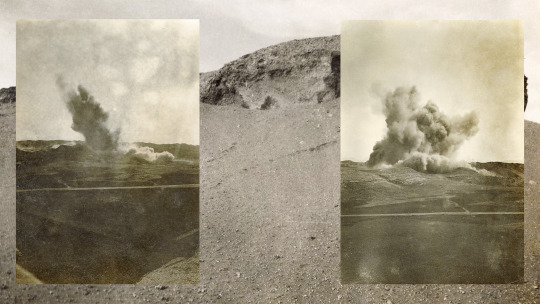
Sanaz Sohrabi Scenes of Extraction 43 min., 2023, Canada / Iran
Scenes of Extraction traces technical and social entanglements between the construction of infrastructures and the political economy of images in the context of fossil fuel extraction in the Iranian oil belt in the first half of the 20th century. Collaging footage from the British Petroleum Archives, aerial footage and amateur material, Sanaz Sohrabi reflects on "reflection seismography" method of oil exploration. With a multi-layered, speculative approach and through the use of CGI maps and spatial renderings fed into an AI software, she uncovers discrepancies in colonial narratives. Scenes of Extraction constructs a historiography that questions the role of images in colonial extractive politics by examining their relationship to the history of photography and to archival strategies.
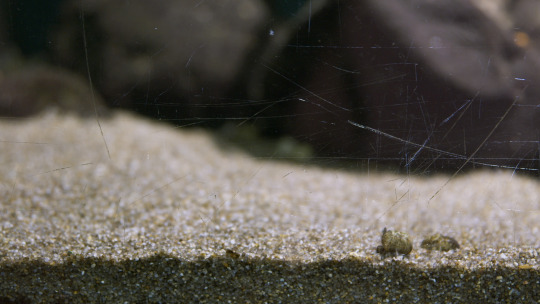
Enar de Dios Rodríguez Liquid Ground 32 min., 2021, AT/ES
The seabed is one of the last unmapped spaces on our planet, and also one of the last unexploited natural spaces. From illustrations of underwater creatures to computer-generated cartographies of the seabed, Liquid Ground dives deep beyond the surface of representation into the abyss of colonization and exploitation of this underwater world. Structured around a child's questioning from a nursery rhyme, the film gradually reveals the complexity of the capitalist self-destructive system and offers a feeling of being trapped in a vicious circle of its consequences. Enar de Dios Rodríguez picks up on images that are deeply inscribed in our worldview and brings to light the visual technologies behind the plundering that simultaneously rely on the resources extracted from the depths of the sea.

Musquiqui Chihying The Sculpture 28 min., 2020
The Sculpture takes two museum collections as its starting point: The recently established collection of African art in the National Museum of China in Beijing and the “imaginary museum” as conceived by the French art theorist André Malraux. Through a succession of black and white photographs and two alternating off-screen voices, the experimental documentary follows the movement of artefacts between the Asian, African and European continents. What happens to an artwork once it is disconnected from its original cultural, geographical, and historical context? And who owns the art collection of the “Musée imaginaire”? Re-enacting a well-known portrait of Malraux, Musquiqui Chihying, reflects on how the Western gaze has modified the meaning of appropriated African artefacts.

Daphné Nan Le Sergent L'image extractive 20 min., 2021
L'image extractive examines the material foundations of photographic and cinematic images. It is an intriguing journey into the economics, extraction and visual circulation of silver halide - the material that has enabled permanent capture of light and shadows in the first place. Can an image look back at its own history? Is it able to witness the ruptured grounds from which it emerged? Daphné Nan Le Sergent considers silver photography through three levels of a production chain: the extraction industry, stock markets and data mining processes. Beginning with the first great silver deposits discovered throughout colonised Americas, the video essay spans stock market fluctuations, Kodak's efforts to digitise photography and data modelling as a way to predict the scarcity of resources.
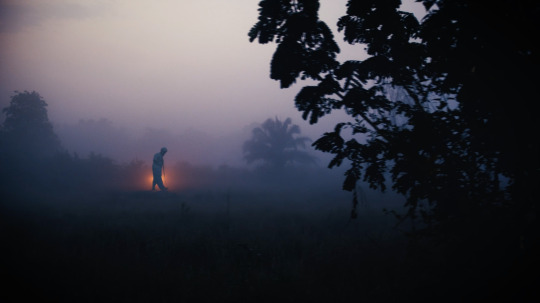
Suneil Sanzgiri Golden Jubilee 19 min., 2021
“When we analyze the images of the past, are we asked to mine the archive?” Trawling the potential of visual storytelling, the Golden Jubilee blends various visual textures and forms of narration; drone videography of Goa’s landscapes, 3D renderings of the filmmaker's family's ancestral home and 16mm footage of the liberation movement. It reimagines the history of a place that has been haunted by financial speculation, mineral extraction and colonialism. This film is the third in a series of works about memory, diaspora and decoloniality. In this piece, Suneil Sanzgiri centres his father’s memory of encountering the “demonic” spirit Devchar, whose task is to protect workers, farmers, and the once communal lands of Goa, but “protection from what?" the filmmaker asks.
Lectures
Caitlin Berrigan works as a visual artist and writer to explore poetics and queer science fiction as world-making practices through instruments and moving images. Her work enfolds the complexity of interrelations across humans and other beings within spatial ecologies, technologies, and systems of capitalism. She has received fellowships and residencies from the Humboldt Foundation, the Graham Foundation and the Akademie Schloss Solitude among others.. Her experimental writings are published by e-flux, MARCH, Duke University Press and Broken Dimanche Press. Currently a Senior Postdoctoral Fellow at the Academy of Fine Arts in Vienna, Berrigan has held full-time and visiting faculty positions at NYU Tisch, Caltech, Bard College Berlin, Harvard, and UMass Boston.
Maia Gusberti is a visual artist and researcher. She transforms lens-based images into multi-layered relational spaces in order to reflect on the relationship between image, gaze and society. Her practice includes curatorial projects such as "Complex Images" (Kino REX, Bern) and "Choreography of the Frame" (Kunsthalle Exnergasse, Vienna). She studied Art and Digital Media (University of Applied Arts, Vienna) and Critical Images (Royal Institute of Arts, Stockholm). Currently, she is a doctoral candidate at the LUCA School of Art and the Lucerne School of Design, Film and Art (HSLU), where she also works as a research assistant. As an artist in residence she worked in Cairo and Amman (Pro Helvetia), Ramallah (Al Mahatta), Paris Cité des Arts and Rome (BMUKK) and in Sofia (Interspace). Gusberti presents her projects at international exhibitions, conferences and festivals.
0 notes
Text

GOLDEN PIXEL TALKS: ABOUT A DRAMATURGY OF THE OPEN FORM
with Christine Lang and Nathalie Koger
Podcast to be heard at www.soundcloud.com/golden-pixel-cooperative Sounddesign by Vinzenz Schwab Curated and conceived by Mona Schwitzer
In the second edition of the Golden Pixel Talks, Christine Lang and Nathalie Koger talk about the dramaturgy of the open form as a reference system. As a counterpart to a closed narrative logic, an open-form dramaturgy requires a clear attitude towards oneself and the world. It is a different kind of storytelling that is episodic and topic-orientated. To what extent can stereotypes of the closed form be avoided with process-orientated work and cooperative production methods? And how is it possible to find a narration based on locations and thereby create other links of thought and contexts of meaning?
Nathalie Koger, artist and art educator, recently made the short film Die Videokonferenz der Tiere and was advised by Christine Lang as part of the GPC Lab. Dramaturge and film scholar Christine Lang is a filmmaker herself and works in the context of film, television and theatre. She is particularly interested in film and series dramaturgy, most recently published David Lynchs „Mulholland Drive“ verstehen (transcript 2023) and is currently preparing a feature film.
GOLDEN PIXEL TALKS invite artists and theorists whose fields of research overlap to a dialogue. The artistic positions of The Golden Pixel Cooperative are expanded to include scientific and socio-political perspectives. This creates a discursive space for a “search movement on the border between knowledge and non-knowledge” (Rheinberger 2012), which unites research in science and art.
Image credit: Pablo Leiva
0 notes
Text
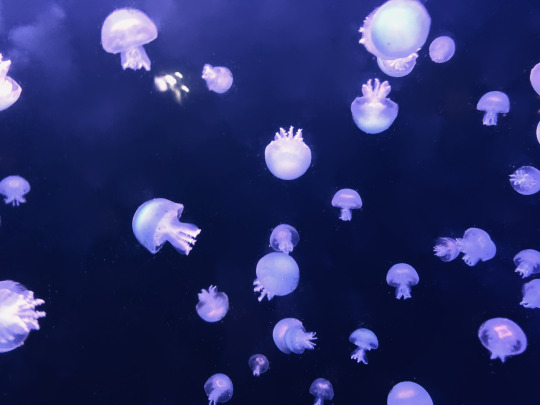
Associative Fields
Script & Dramaturgy Workshop
with Iris Blauensteiner
Wednesday, 06.12.2023, 2-6 pm Medienwerkstatt Vienna Neubaugasse 40A, 1070 Vienna
Based on the text "The Carrier Bag Theory of Fiction“ (Ursula K. Le Guin), we will enter associative fields and research narrative structures. Using objects brought along and in exchange within the group, we work on formal and dramaturgical possibilities for the participants' own artistic film, video, or moving image projects. We will experiment with ideas around the How of content and the Why of its connections.
Please bring your writing tools and your thoughts about the artistic project you want to work on! Information about the preparation will be sent to you before the workshop.
We kindly ask you to register by 30.11.2023 to [email protected]
Participation is free of charge, but the number of available places is limited, so we will consider registrations in the order they are received. The workshop can take place in German and English. The event is part of the workshop series "Sharing Skills" by The Golden Pixel Cooperative.
Iris Blauensteiner works as a filmmaker and writer. She is a member of the Golden Pixel Cooperative. www.irisblauensteiner.com
0 notes
Text
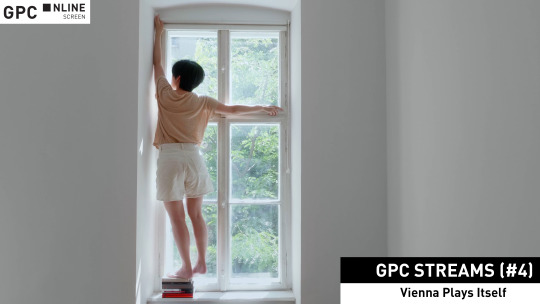
GPC Streams (#4) Vienna Plays Itself
Online Screening
Conceived by Elena Cooke und Katrin Euller Artists: Miae Son, Charlotte Gash, Laura Nitsch
22/11/2023 - 28/11/2023 21:00 - 22:11 (in your timezone) Each evening on GPC Online Screen http://streaming.goldenpixelcoop.com
Vienna Plays Itself presents works by three feminist filmmakers and artists, each with a linking thread: Vienna. These artists have all studied, lived and worked in Vienna and their works reflect on their experiences. Through the artist's different critical approaches, also towards image production, we witness encounters and struggles with identities, bodies, and art politics.
Miae Son’s work, ‘Bigger’, takes a poetical and critical approach towards the dominance of western philosophy. It addresses the difficulties of a migrant woman’s body from her everyday life in a classical European living space.
Blurring the boundaries between documentary and fiction, in ‘Tunnel of Inclusion’, Charlotte Gash uses Vienna’s art scene to act, and then presents it back like a mirror to the art world. In ‘Violett’, Laura Nitsch discusses the historical period of Red Vienna in terms of in/visibilities, class differences and the construction of sexuality and gender.
Programme:
Miae Son: Bigger, 2022, Austria, 8:57 min.
Charlotte Gash: Tunnel of Inclusion; Behind the Scenes Documentary, 2023, Austria, 28:58 min.
Laura Nitsch: VIOLETT, 2023, Austria, 31:40 min
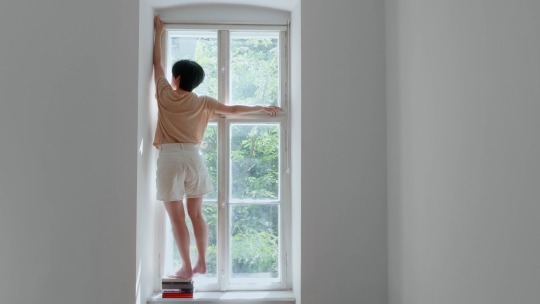
Miae Son: Bigger, 2022, Austria, 8:57 min.
The artist, as the protagonist, is standing at a window in an old Viennese apartment. She struggles to fix a broken blind mounted high above. She climbs the narrow windowsill, stretches her body but falls short. Placing books by male philosophers who have shaped European discourse as support, she finally reaches the blind.The texts translated into Korean indicate, on the one hand, the need for a sense of linguistic security and on the other, they reveal an inner compulsion to appropriate this European canon, which is shaped by power relations. Bigger addresses the difficulties of a migrant woman’s body from her everyday life in a classical European living space and the domination of western culture.
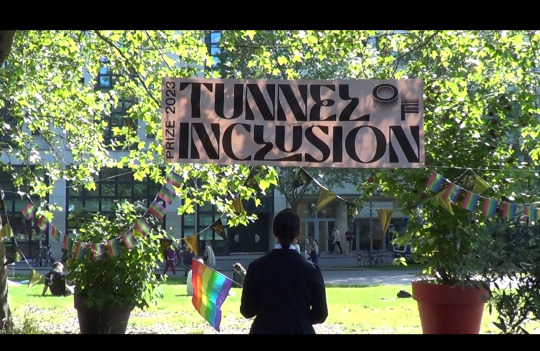
Charlotte Gash: Tunnel of Inclusion; Behind the Scenes Documentary, 2023, Austria, 28:58 min.
Tunnel of Inclusion; Behind The Scenes Documentary is a behind the scenes mockumentary style persiflage of installing a prize exhibition showcasing the young Austrian art scene, on display at Kunsthalle Karlsplatz Wien. Tunnel of Inclusion; Behind The Scenes Documentary follows CURATOR hiring a film crew to make a documentary about her first institutional exhibition. Problems arise on the way towards the day of the opening, following the ARTISTS, DIRECTOR OF INSTITUTION, ASSISTANTS and the CURATOR work towards the fine art academies award exhibition, as characters CHARLOTTE, ARTIST 1, ARTIST 2 and ART BITCH prepare for the award ceremony where the prize will be announced.
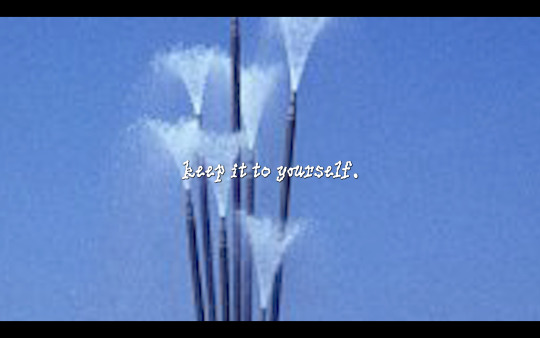
Laura Nitsch: VIOLETT, 2023, Austria, 31:40 min.
VIOLETT is an experimental documentary, concerned with the in/visibility of class differences in the historical construction of sexuality and desire. Putting emphasis on the geopolitical context of Red Vienna (1918-1934), the film approaches the tension between in/visibility, memory and history writing.
0 notes
Text
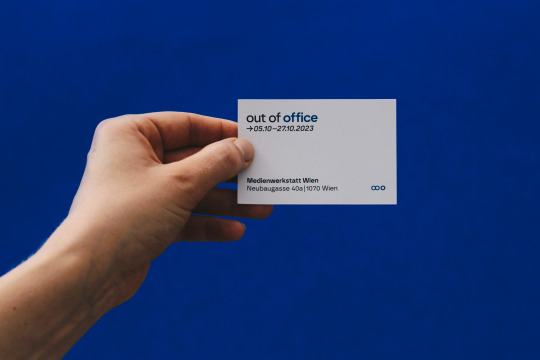
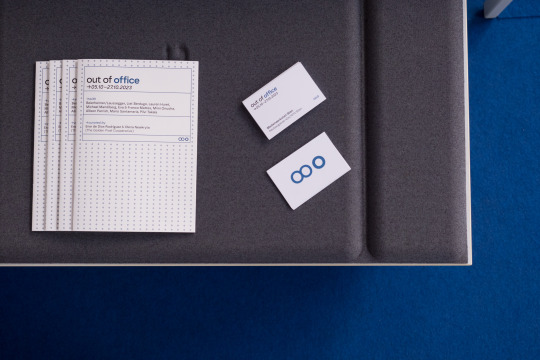
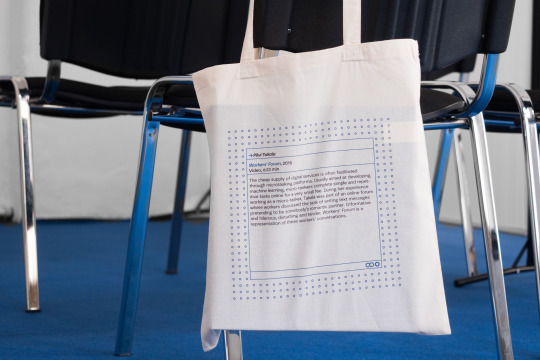

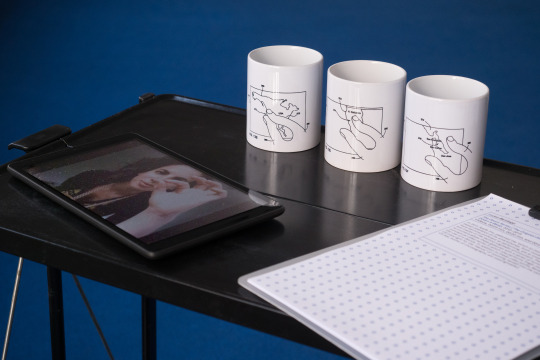
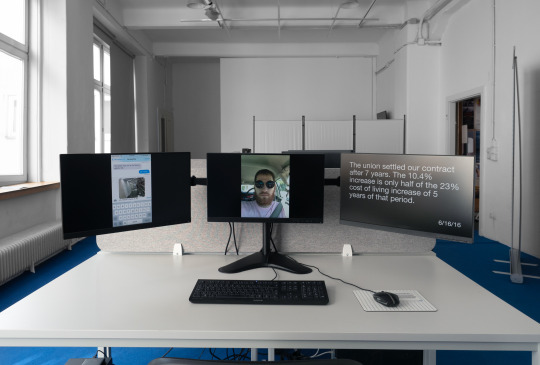
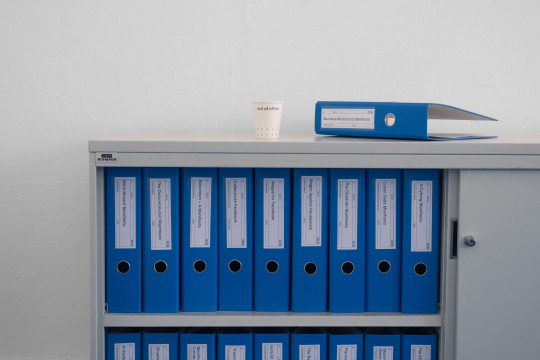


out of office
Group exhibition 06/10-27/10/2023 Tue-Fri, 17:00-20:00 and on request Opening: 05/10/2023, 19:00 Medienwerkstatt Wien Neubaugasse 40a, 1070 Vienna
with Beierheimer/Laussegger, Liat Berdugo, Lauren Huret, Michael Mandiberg, Eva & Franco Mattes, Mimi Ọnụọha, Allison Parrish, Mario Santamaría, Pilvi Takala
curated by Enar de Dios Rodríguez & Olena Newkryta (The Golden Pixel Cooperative)
Behind each screen, each piece of digital information, each data exchange, hides a complex assemblage of material and labour, which includes not only mined minerals and electrical networks, but also present and removed workforces. The obfuscated labour sometimes takes the shape of a hand that extracts, or an eye that watches endless sets of images, or an ear that attends the way the fans are roaring. The screen is thus a giant constellation of paid and unpaid labour, and any of its offered clicks is directly tied to geographically dispersed workers. These are workers who are mostly overloaded, underpaid, and highly dependent on their own screens. How can we witness the work that takes place behind the screens? Triggered by this urgent question, The Golden Pixel Cooperative (Olena Newkryta and Simona Obholzer) organised an online symposium in 2022 to which artists and thinkers were invited to respond. Titled Screen Matters - The screen as a place of work, the symposium examined various ways in which workers are being physically, emotionally, and cognitively exhausted by new forms of digital labour. The group exhibition out of office is an attempt at exposing this topic through the presentation of artistic works in a speculative setting—a co-working space replicated by the exhibition display aesthetics.
The show presents a wide variety of artistic approaches by contemporary practitioners that range from video and web-based pieces to the documentation of certain forms of labour performed by both humans and automated machines. The common thread shared by all the artworks is the positionality of the artists themselves, who appear as absent screen workers (creative or otherwise), and whose conscious representation of labour is the main protagonist of each piece. Despite this common denominator, the wide variety of screen work is reflected by the diverse types of workers featured in the exhibition: a micro-worker, a bot developer, programmers of computer-generated text, a creator of personalized digital-data portraits, a patent issuer of digital-related gestures, an organizer of crowdsourced digital images, and media artists. Rather than giving in to the invisibility of labour, in out of office the artists' absence from their place of work suggests a potential retreat from the whirlwind of clicks, scrolls and screens.
0 notes
Photo
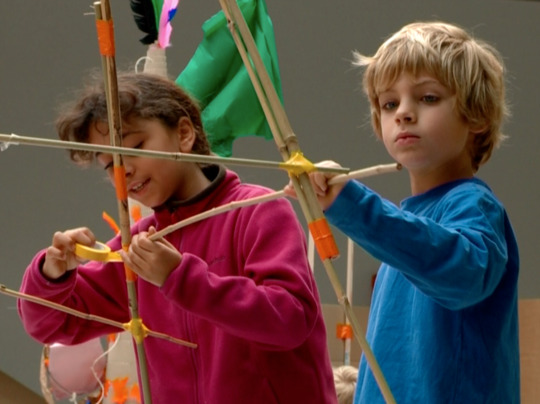

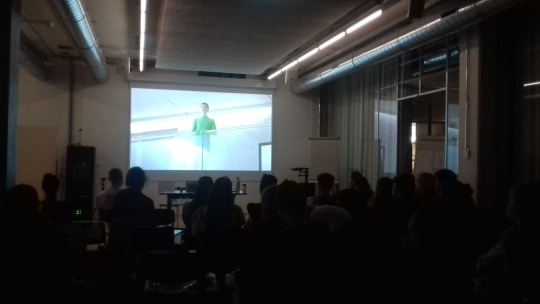

Visit to NOW<->FUTURE?
Book presentation, film screening & workshop 05.06.2023–06.06.2023
Bern University of the Arts Fellerstrasse 11, 3027 Bern, Switzerland
Conceived by: Enar De Dios Rodríguez, Annemarie Hahn, Nathalie Koger
The series is a collaboration between Bern University of the Arts / Master Art Education Program / Annemarie Hahn and The Golden Pixel Cooperative.
NOW<->FUTURE? is the title of this year's networking meeting of art education students from all over Switzerland at the Bern University of the Arts.
05.06.2023 · Book Presentation You’ll Never Work Alone: Collective Infrastructures in Moving Images
Start: 6 PM Duration: approx. 60 minutes Location: Bern University of the Arts, Fellerstrasse 11, Small Auditorium, 3027 Bern And via Zoom at: https://phbern.zoom.us/meeting/register/u5YpdeCopjwqGNafYQW5au4UEtjJishI6PUA
Presented by Enar de Dios Rodríguez & Nathalie Koger (from The Golden Pixel Cooperative/Vienna), and as a guest, Katja Lell (University of Cologne).
The publication explores the potentials and challenges of collective cinematic and artistic work and raises the question of shared infrastructure through international and local perspectives of theorists and practitioners.
Our guest, Katja Lell, will present her text: On Overturned Charis, Soft Pillows, and (Dis-)comfort with Accomplices - Thoughts on Queering Film Education.
Spatial intervention in dialgue with Katja´s Lell book contribution with objects by Nathalie Koger and Wolfgang Obermair from the installation Places that are only built as signs from a distance. Up close, they have no name., 2018.
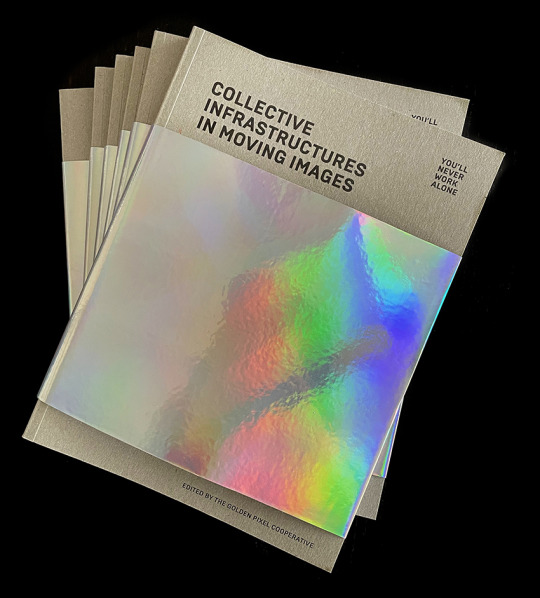
Publication: The Golden Pixel Cooperative: De Dios Rodríguez, E., Koger, N., & Schwitzer, M. (Eds.). 2022. You'll Never Work Alone: Collective Infrastructures in Moving Images. SCHLEBRÜGGE.EDITOR..
06.06.2023 · Film Screening Frame Works. Educational Contexts and Moving-Image Works
Start: 9:15 AM Duration: approx. 90 minutes Location: Bern University of the Arts, Fellerstrasse 11, Auditorium, 3027 Bern Artists: Adelita Husni-Bey, Nathalie Koger
The screening showcases two films: Postcards from the Desert Island, 2010-11 by Adelita Husni-Bey and The Video Conference of the Animals by Nathalie Koger. Created with children and young people in educational contexts, these films explore ethics of coexistence in symbolic and imaginary forms. It will be followed by a Q&A session with Nathalie Koger.
Additionally, the film Vestiges (an archipelago) by Enar De Dios Rodríguez will be on view at Bern University of the Arts, as part of the networking week NOW<->FUTURE.
FILMS
Adelita Husni-Bey: Postcards from the Desert Island, digital video, color, sound, 2010-11, 23 min. The film Postcards from the Desert Island by Adelita Husni-Bey showcases her collaboration with a self-managed public elementary school in Paris. During a three-week workshop, the artist invited children to transform their classroom into a deserted island. The film documents how the group of children embraces a social life in the no man's land, and it portrays their engagement with some of the key principles and unresolved issues of self-management.
Nathalie Koger: The Video Conference of the Animals, 2023, Video 4K, color, sound, 2023, 30 min. The Video Conference of the Animals by Nathalie Koger is a 30-minute documentary-fiction in which narratives from the children's book "The Conference of the Animals" by Erich Kästner are transposed and appropriated into the present era: the Anthropocene. The work was developed together with a group of children and teenagers from a school in Germany as well as some individual pupils from Austria.
Enar De Dios Rodríguez: Vestiges (an archipelago), HD video, color, sound, 2020, 40 min. Vestiges (an archipelago) by Enar De Dios Rodríguez is an audiovisual essay that investigates humans’ insatiable demand for sand, the most extracted natural resource after water. A poetic narrative maze where colonialism, dredging machines or land reclamation projects emerge.
06.06.2023 · Workshop Introduction into Research Tools of Internet Based Images, Moving-Image Works and Related Matter
Start: 11 AM Duration: approx. 90 minutes Location: Bern University of the Arts, Fellerstrasse 11, 3027 Bern Facilitators: Enar De Dios Rodríguez, Annemarie Hahn, Nathalie Koger
The workshop serves as an introductory overview of online archives that could be useful for research, artistic and teaching purposes for the students. Following that, we will engage in a hands-on, playful, and imaginative exploration of the medium of sound, focusing on the themes of the networking week: How does the future I envision sound? How can the manifesto we write during the networking week sound?
Please bring (if available): audio recording device or mobile phone, laptop with audio software.
Image credits: 1st image: Adelita Husni-Bey: Postcards from the Desert Island, 2010-11, Video still © Husni-Bey 2nd image: publication: The Golden Pixel Cooperative: De Dios Rodriguez, E., Koger, N., & Schwitzer, M. (Eds.). 2022. You'll Never Work Alone: Collective Infrastructures in Moving Images. SCHLEBRÜGGE.EDITOR. Book cover and banderole © bildrecht Vienna, 2023 / Nathalie Koger
Funded by the Cultural Department of the City of Vienna, the Federal Ministry for Arts, Culture, Civil Service and Sport, The Golden Pixel Cooperative, and the Bern University of the Arts.
0 notes